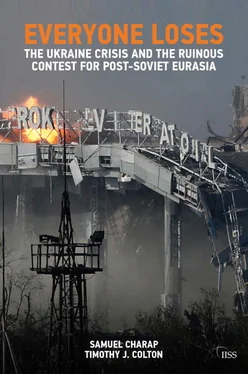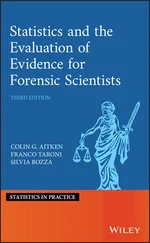Ukraine, having committed through its president to some form of this outcome at Minsk, has refused to follow through on it. Only the parliamentary opposition, mostly one-time members of Yanukovych’s Party of Regions, has voiced support for fulfilling Minsk II in its entirety. Denunciations of the agreement as unsatisfactory or even treasonous have been far more commonplace among the political elite. Some favoured biding time until the Donbas can be retaken by force, a scenario referred to as the ‘Croatian option’, a reference to Croatia’s forceful retaking of the Srpska Krajina in 1995. Others said Ukraine should press forward with some elements of Minsk II, but only enough to disprove claims that Kyiv is responsible for its failure. [62] See, for example, Andrew E. Kramer, ‘Ex-Professor Upsets Ukraine Politics, and Russia Peace Accord’, New York Times , 18 March 2016, http://www.nytimes.com/2016/03/19/world/europe/ukraine-oksana-syroyid.html ; ‘Seichas my mozhem tol’ko derzhat’ oboronu — Lutsenko’, 24 kanal, 7 September 2014, http://24tv.ua/ru/seychas_mi_mozhem_tolko_derzhat_oboronu__lutsenko_n482512 ; Vladimir Gorbulin, ‘Est’ li zhizn’ posle Minska?’, Zerkalo nedeli , 12 February 2016, http://gazeta.zn.ua/internal/est-li-zhizn-posle-minska-razmyshleniya-o-neizbezhnosti-neobhodimyh-izmeneniy-_.html .
In the short term, Kyiv’s tacit preference was for a frozen conflict: dodging the political aspects of Minsk II, but ending the active fighting while severing rebel-held Donbas from the rest of the polity. In this scenario, the line of contact would become a de facto border, like the inner German border during the Cold War. The influence of the Donbas over politics in the capital would be eliminated, and thus Moscow’s sway over Kyiv would be minimised. Russia would have to foot the bill for the reconstruction effort and for the costs of preventing a socio-economic implosion in its new protectorate.
The problem for Kyiv is that this frozen-conflict scenario is a non-starter for Moscow. As an authoritative Russian political insider put it, ‘To get Donbas and lose Ukraine represents a defeat for the Kremlin. In that case, it would be better not to have started [supporting the insurgency] in the first place.’ [63] Vladimir Lukin interview in Marat Gel’man, ‘Voennyi plan Kremlya’, Novoe vremya , 30 August 2014, http://nv.ua/opinion/gelman/voennyy-plan-kremlya--9686.html . Lukin, the former ambassador to the United States quoted in Chapter 1, was Putin’s representative at the talks that produced the 21 February agreement.
Following this logic, Russia has kept up its support for the armed rebels in the Donbas – and for the region’s civilians – while increasing its command and control. This led, as of late 2016, to a conflict more aptly described as simmering than frozen, defined by continuous low-level fighting punctuated by periodic upticks in violence. The ensuing security challenge overloaded the Ukrainian government’s political bandwidth and absorbed a disproportionate share of an already hard-pressed budget. As a result, the Ukrainian economy remained in disarray, and few investors had the fortitude to return. But Moscow calibrated the fighting so as not to spark an all-out war or a more forceful Western response.
By supporting the Donbas insurgency, Russia has effectively been able to keep Ukraine off-kilter. But it is no closer to getting the political settlement it wants. Despite several follow-up Russia–France–Germany–Ukraine summits and numerous ministerial meetings, the most concrete result since the signing of Minsk II was an agreement in December 2015 to extend the deadline for implementation of the deal into 2016. The package of constitutional reforms that would partially fulfil the central political requirement has not made it through the Ukrainian parliament and there is no agreement on procedures for conducting local elections in the conflict zone. Moreover, the amnesty provision has not been passed, and Kyiv has enforced an economic blockade of separatist territory, as well as severe restrictions on freedom of movement across the line of contact. An embattled Poroshenko is loath to expend political capital on unpopular steps that would end up empowering the Donbas, the traditional stronghold of his political opponents.
The domestic stalemate in Ukraine resonates with an international stalemate. The war and Kyiv’s dysfunction have nullified any immediate risk to Russia of losing Ukraine to the West, the worst-case scenario that had driven its behaviour. Yet neither Russia nor the West has made a good-faith effort to find common ground on the geopolitical and geo-economic conflict over Ukraine’s trajectory. US and European officials continue to declare their support for Ukraine’s ‘European future’, while the NATO and EU bureaucracies busily deepen integration with Kyiv. While there is no momentum for formal membership offers in the short term from either organisation, the possibility of such an offer in the future is explicitly still in play, even if that future is a distant one. Moscow, of course, seeks to rule out such a possibility and roll back the integration that has already occurred. Therefore, even if Minsk II can somehow be implemented, the core contestation between Russia and the West over Ukraine will be no closer to resolution.
Neither side has sought an inclusive, negotiated settlement. The negotiations that did take place concerned the minutiae of the several Minsk agreements. But disputes over details such as the rules governing local elections in the Donbas are really proxies for the broader conflict that remains unaddressed. At an October 2014 meeting of EU leaders, Poroshenko and Putin in Milan (after Minsk I but before Minsk II), Merkel pushed the Russian president to commit to hold local elections under Ukrainian law, silence the rebel guns and hand back control over the border. Putin balked, claiming that both sides were failing to make good on their commitments. Poroshenko objected, and the EU leaders took his side. Predictably, the meeting ended in failure, with the EU and Russia blaming each other. [64] Neil Buckley et al., Unpublished reporting provided to the authors, February 2015.
Barring a high-level effort to address the first-order issues, such meetings cannot produce breakthroughs. Even full implementation of Minsk II would in effect allow the conflict to continue without the use of military force.
Indeed, in parallel to the war in the east, the geo-economic contest between the EU and Russia over Ukraine continued in meeting chambers in various capital cities. On 26 August 2014, just before the first direct Russian intervention in the Donbas, EU leaders gathered with the presidents of Russia, Ukraine, Kazakhstan and Belarus for talks in Minsk. The formal agenda of the meeting was to address the conflict over Ukraine’s DCFTA with the EU. Putin kept many of his public remarks focused on this very point, alleging grave consequences from the DCFTA for Russia–Ukraine trade ties. He said:
Russia has stated on numerous occasions that full acceptance by our Ukrainian friends of all the tariff liberalisation requirements and the adoption of the European Union’s technical, food safety and veterinary norms will have a negative impact on the scope and dynamics of trade and investment cooperation in Eurasia. By very conservative estimates, the total loss for the economy of Russia alone may amount to 100 billion roubles during the first stage, that is $3 billion. This will affect entire sectors of our economy and agriculture, with all the attendant consequences for economic growth and employment rates. [65] ‘Vystuplenie na vstreche glav gosudarstv Tamozhennogo soyuza s Prezidentom Ukrainy i predstavitelyami Evropeiskogo soyuza’, 26 August 2014, http://kremlin.ru/events/president/transcripts/46494 .
Читать дальше











